American and British people have two names: a “first” name and a “surname (姓) ” or “family” name.
When people do not know each other very well, they use surnames with “Mr. ” for men, “Mrs. ” for married women, and “Miss” for unmarried women. Some women don’ t like to say if they are married or not. When they write their names, they use “Ms. ”, not “Mrs. ” or “Miss” . People never use “Mr. ”, “Mrs. ”, “Miss” or “Ms. ” with first names alone.
Some people have middle names: Winston Spencer Churchill. British people do not use their middle names, but Americans often give the initial (首字母) : John F. Kennedy.
When a woman marries, she usually does not use her old sumame any more, but takes her husband’ s surname. The children have their father’ s surmame too. So, if Susan Brown marries John Smith, she becomes Susan Smith and their children are Elizabeth Smith and Tom Smith.
Some American men have the same first name as their father. The son puts Jr. (Junior) after his name, and the father puts Sr. (Senior) after his name: Martin Luther King Sr.
“Sir” is a British title (称谓) for men having done a lot for their country. “Sir” is used with the first name, not with the surname alone: Sir Winston, or Sir Winston Churchill (not Sir Churchill).
1. When people don’ t know each other very well, how do they call each other?| A.By using first names. | B.By using sumames only. |
| C.By using the full names. | D.By using surnames with “Mr. ” or “Ms. ” . |
| A.“Sr. ” in the name means he is great. |
| B.He has a son having the same name as him. |
| C.“King” means his wife’ s old surname is King. |
| D.He has a father having the same name as him. |
| A.British people usually use their middle names. |
| B.We can use “Mrs. ” in front of an unmarried woman’ s name. |
| C.“Sir” is used to show someone who is great and before the first name in Britain. |
| D.It’ s common for married women to continue using their old surnames. |
相似题推荐
【推荐1】When you travel to different countries, you’ll find that people have different habits of giving directions(方向).
| A.To draw a map |
| B.To point to landmarks |
| C.To use body language |
| D.To give a wrong answer |
| E.To lead you there |
| F.To tell directions and distance |
【推荐2】What brings a nation together? Of the four choices—shared values, language, history, and religion (宗教), it’s shared values. In our latest poll (民意调查), 7 out of 16 countries chose values as the greatest factor bringing a nation together, and six preferred language. Both choices scored high in the poll, suggesting that our values and how we express them are closely connected. Still, history was not forgotten in some countries, especially in Mexico and Russia. Even Canada and the United States chose national histories as the second-most important factor that united their people. The biggest surprise? Not one country picked religion as its top choice.
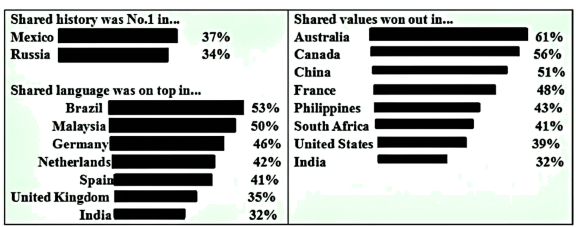
Church and state
Most people who were polled do not connect their religious beliefs to their national pride. Religion ranked last in 13 countries—with France scoring it at 1%, the lowest of all.
1. Americans considered ________ as the second-most important factor to bring a nation together.| A.language | B.values | C.history | D.religion |
| A.China. | B.Mexico. | C.France. | D.America. |
| A.38% | B.44% | C.50% | D.61% |
| A.团结 | B.鼓励 | C.联系 | D.分裂 |
| A.Shared values and language were considered equally important in India. |
| B.1% of the French picked shared religion as their top choice to unite people together. |
| C.More Germans believed shared language was the greatest factor than Brazilians did. |
| D.Over half of Australians took shared values as the top factor bringing a nation together. |
【推荐3】When you wear something, you are often saying, "Look at me!" Your clothing communicates to the world what you want the world to think of you. For example, when you go on a job interview, you might choose clothes that make you seem sincere. When you go to a party, you might choose clothes that make you look exciting.
___1 In Scotland and parts of the countries of East and Southeast Asia, men as well as women wore skirts. In Turkey and China and among the Inuit, both men and women wore trousers. But in ancient Greece, men who wore trousers were thought to be savages(野蛮人).In the United States today, both men and women wear pants.
_____2 Over the centuries, anthropologists(人类学家)have learned that the clothing people wore was connected to the position they held in society. In most societies, important people put on special clothing to show their power. In the 18th, kings and queens wore special clothing, often specially made and difficult to keep clean. Since poor people could not afford to wear this kind of clothing, it became a symbol of wealth.
_____3 Today some people still wear clothing that represents their position in life. Sometimes clothing clearly shows the organization that a person works for. Postal workers, airline attendants, and some factory workers wear uniforms. Others wear expensive clothes that show their social position as wealthy people.
4 Now many teenagers and adults buy clothes from a certain designer or company. They may like the good name of the designer or the company and want to share that name. But one basic reason for choosing clothes is the same as it has always been. People choose their clothes to tell others who they are and what they like.
1. The sentence "In different civilizations(文明)at different times, different kinds of clothes have been acceptable(可接受的). "can be put in Blank ________________.| A.1 | B.2 | C.3 | D.4 |
| A.They like the designer's good name. |
| B.They work for the designer's company. |
| C.They want more people to know the designer. |
| D.They think it makes it easier to choose clothes. |
| A.their work | B.their wealth | C.their appearance | D.their position |
| A.people might not look attractive in new clothes |
| B.each new period brings some changes in clothing |
| C.clothes from good designers or companies sell well |
| D.people who belong to organizations must wear uniforms |
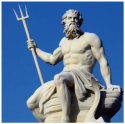 | Zeus (宙斯)—the god of thunder, law, order, fate and more. Zeus is the youngest son of Cronus and Rhea. He took his father’s place and became the king. Zeus is the Father of Gods and men. In artwork, he is a serious middle-aged man with a strong body and dark beard (胡须). |
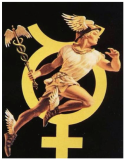 | Hermes (赫耳墨斯)—the god of travel, transportation, communication, sports and more. Hermes is the son of Zeus. He sends messages between gods and men. In artwork, he is a handsome young man without beard. |
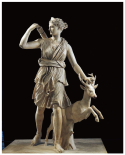 | Artemis (阿尔忒弥斯)—the goddess of animals, young girls, childbirth and more. Artemis is the daughter of Zeus and the twin sister of Apollo. In artwork she is a young woman dressed in a short knee-length dress. Artemis likes living a free and independent life. She likes outdoor activities, especially hunting. She doesn’t like being married. |
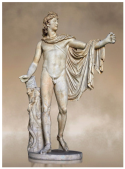 | Apollo (阿波罗)—the god of light, truth, music and more. Apollo is the son of Zeus, and the twin brother of Artemis. Apollo is the most handsome god. In artwork, he is a young man with long hair. Apollo is a great god. He never tells lies and many goddesses love him. |
| A.The god of light. | B.The god of law. |
| C.The god of music. | D.The god of animals. |
| A.Father and son. | B.Mother and daughter. |
| C.Husband and wife. | D.Brother and sister. |
| A.She likes singing. | B.She likes writing poems. |
| C.She likes keeping pets. | D.She likes outdoor activities. |
| A.A middle-aged man with beard. |
| B.A young man without hair. |
| C.A young man with long hair. |
| D.An old man in a short dress. |
| A.Zeus loves his father a lot. |
| B.Hermes used to be a common person. |
| C.Artemis dislikes being married. |
| D.Apollo has a lot of wives. |
 | (1726) | Jonathan Swift (Britain) | Jonathan Swift’s Gulliver’s Travels comes first in the list of the novels written in English. It tells a story of a doctor named Gulliver travelling around different countries, meeting strange things. |
 | (1719) | Daniel Defoe (England) | By the end of the 19th century, no book in English literary history had enjoyed more translations than Robinson Crusoe. |
 | (1749) | Henry Fielding (Britain) | Tom Jones is a classic English novel that captures the spirit of its age and whose famous characters have come to represent Augustan society. |
 | (1818) | Mary Shelley (the UK) | Frankenstein is Mary Shelley’s first novel. It has been praised as the world’s first true science fiction in English. |
 | (1838) | Edgar Allan Poe (the US) | The Narrative of Arthur Gordon Pym of Nantucket is Edgar Allan Poe’s only English novel. It is a classic adventure story with supernatural elements—has influenced generations of writers. |
| A.A writer. | B.A doctor. | C.A soldier. | D.A stranger. |
| A.Jonathan Swift. | B.Daniel Defoe. | C.Mary Shelley. | D.Edgar Allan Poe. |
| A.Gulliver’s Travels. | B.Frankenstein. | C.Robinson Crusoe. | D.Tom Jones. |
| A.Robinson Crusoe had the most translations by the end of the 19th century. |
| B.Mary Shelley’s first novel was Frankenstein. |
| C.The Narrative of Arthur Gordon Pym of Nantucket was written in the 18th century. |
| D.These novels above are all written in English. |
| A.Famous writers | B.An advertisement for books |
| C.A report on novels | D.Classic novels in English |
【推荐3】When we talk about the Vikings, we usually think of the Viking soldiers. They sailed to other countries across the sea and fought with the people there. But in fact, at that time most Vikings stayed in their home countries of Norway, Denmark or Sweden. They lived peaceful lives. Some Vikings lived with their families on farms without any neighbors, but most lived in towns. Towns were often near the sea or a river, so ships could arrive easily. It was an important place for people to buy and sell lots of different objects, including clothes, food, plates, jewellery and many other useful things. So they really did well in trading.
(—From The Vikings)
1. How did the Viking soldiers go to other countries?| A.On horses. | B.On foot. | C.By ship. | D.By bike. |
| A.Norway. | B.Denmark. | C.Sweden. | D.England. |
| A.Peaceful. | B.Careful. | C.Colorful. | D.Wonderful. |
| A.Because the Vikings liked swimming. | B.Because ships could arrive easily. |
| C.Because they could go fishing easily. | D.Because the Vikings needed lots of water. |
| A.Viking people were all soldiers. | B.The Vikings all liked fighting. |
| C.The Vikings were really good at trading. | D.Most Viking people lived on farms. |
【推荐1】Beijing Opera is China’s national quintessence(国粹). It’s one of the most important opera styles in China. It has a history of over 200 years. Even though it is called Beijing Opera, the origins(起源)of it are not in Beijing but in Anhui and Hubei. Sheng, Dan, Jing and Chou are four main roles in Beijing Opera.
No. 1 Sheng
Sheng is an important role in Beijing Opera and it is for men. This role mainly includes Laosheng, Xiaosheng, Hongsheng, Wawasheng and Wusheng. Laosheng is for the older role.
No. 2 Dan
Dan is for the woman role in Beijing Opera. It includes Zhengdan, Huadan, Wudan, Daomadan and so on.
No. 3 Jing
Jing is for the man role with a painted face. It includes Zhengjing, Fujing, Wujing, Maojing and so on.
No. 4 Chou
Chou is for the man clown(小丑)role with a painted face. It is a funny role in Beijing Opera. It mainly includes Wenchou and Wuchou.
1. Beijing Opera may come from _________.| A.Anhui and Hubei | B.Chongqing | C.Beijing | D.Sichuan |
| A.Three. | B.Four. | C.Five. | D.Six. |
| A.Sheng. | B.Dan. | C.Jing. | D.Chou. |
【推荐2】Every time when I look at the moon, I wish I could go there. Do you wish you could fly to the moon in a spaceship one day?
For hundreds of years, men have wanted to travel to the moon. When they looked at the moon, they asked many questions. Was the moon hot or cold? Were there any plants or other living things there? There were many, many other questions.
We know much about the moon now. Scientists have studied the moon for many years and have found out many facts. So far, some men have got to the moon on spaceships.
Scientists have found that the moon is much smaller than the earth. It is about one quarter the size of the earth. It is traveling round the earth all the time. There are not any plants or other living things on the moon, because there is no air or water there.
Days and nights on the moon are very long. One day on the moon is as long as two weeks on the earth. One night is also as long as two weeks on the earth. In the day the moon is very hot. At night it is very cold. The moon is much hotter and much colder than the earth.
There is another surprising thing. On the moon things are not as heavy as they are on the earth. Isn’t that interesting?
Perhaps one day we can all travel to the moon. It must be great fun.
1. There are not any plants or other living things on the moon, because ________.| A.there is no air or water there | B.it’s too hot there |
| C.it’s too cold there | D.there is only sand on it |
| A.one quarter | B.one third |
| C.three quarters | D.half |
| A.one week | B.two weeks |
| C.one month | D.two months |
| A.heavier than | B.smaller than |
| C.as heavy as | D.lighter than |
【推荐3】Four students from different countries are camping and they are talking about the weather. Let’s listen to them!
Tiffany: It’s cool and sunny most of the time in our country. I live in Beijing, a beautiful city(城市). It’s summer now. It is a little hot, but I still feel good.
Lolita: I live in Moscow. It’s usually windy there. It makes me feel bad. I don’t like that.
Ben: I live in the north of Canada. It’s very cold in winter, so we wear warm clothes. Many people like snowy weather because they can make snowmen and Canada is beautiful then.
Jeff: I come from Australia. I never see a snowy day. It’s very hot most of the time in our country. And in winter it’s not very cold. Many people like to come to my country for their vacation.
1. ________ doesn’t like the weather of his/her country.| A.Jeff | B.Lolita | C.Tiffany | D.Ben |
| A.snowy | B.rainy | C.windy | D.cloudy |
| A.Tiffany comes from Australia | B.it’s usually warm in Moscow |
| C.Ben lives in the south of Canada | D.many people like to go to Jeff’s country for their vacation |
| A.different habits | B.different talks in different cities |
| C.different countries | D.the weather in different countries |
Many people go to different countries and live in different places in lifetime. In different countries, they may meet with different manners. Sometimes they are confused by the different manners, and maybe they make a joke about those manners. So when we go to a strange country, we should pay attention to something new or dissimilar. For example, most Westerners don’t care too much about manners in social matter. But there are a few table manner the Easterners should try to follow at all times.
 | Put the napkin on your lap. This protects your clothes from food or is used to wipe your hands or mouth when necessary. |
 | Hold the knife in your right hand and the fork in your left hand, and cut the meat into pieces before you eat. Always use your fork to put the food into your mouth. Use your spoon only for soup or other liquids. |
 | Don’t put your own utensils (fork, knife, spoon) into the serving (公用) bowl. Use the utensil in the bowl to put some of the food on your own plate, and then return the serving utensil to the bowl. |
 | Don’t spit food anywhere. If you have bones in your mouth, take them out with your fingers and place them on the edge of your plate, never on the table or floor. |
 | Don’t reach across the table or in front of another person. Ask someone to pass whatever you want. |
| A.惊奇的 | B.迷惑的 | C.失望的 |
| A.cut the meat into pieces |
| B.clean the meat with your napkin |
| C.hold the meat with your left hand |
| A.wants something from the table |
| B.takes out the bones in his mouth |
| C.wants to eat the food on his own plate |
| A.putting bones on the plate |
| B.standing up and getting it by yourself |
| C.asking someone else to pass it on to you |
| A.western social rules | B.western table manners | C.western traditional food |
【推荐2】In China, here is a fun activity (活动) on a baby’s (婴儿) 1st birthday. People call it “Zhuazhou”.
On that day, parents usually put a small table on the bed. On the table, there are some books, pens, food, toys and so on (等等). Then parents put the baby at the table and the baby can take anything on it.
If a baby takes a book, people will say he or she will be good at writing. If a baby takes a kitchen utensil (厨具), people will say he or she will be a good cook (厨师). When a baby takes a cake or a toy, people will say he or she will know how to have a good time in life.
Today, there is a “Zhuazhou” for my cousin. He takes a book from the table. My uncle is very happy and calls him “Wenhao”. He puts much hope (希望) on the name.
1. Parents have the activity “Zhuaxhou” when the baby is ________.| A.one week old | B.one month old | C.one year old |
| A.put a table on the bed | B.sit at the table | C.take the things on the table |
| A.the book | B.the table | C.the bed |
| A.She will be a cook. | B.She will be a writer. | C.She will play sports well. |
| A.My uncle loves reading books very much. |
| B.My uncle wants my cousin to be a writer. |
| C.My cousin takes a book in his “Zhuazhou” activity. |
【推荐3】Before you go to another country, it is a great help if you know the language and some of the customs (风俗) of the country.
When people meet each other for the first time in Britain, they say “How do you do?” and shake hands (握手). Usually they do not shake hands when they just meet or say goodbye, but they shake hands after they haven’t met for a long time or when they will be away from each other for a long time.
Last year, a group of German students went to England for a holiday. Their teacher told them that the English people hardly shake hands, so when they met their English friends at the station, they kept their hands behind their backs. The English students had learned the Germans shake hands as often as possible, so they put their hands in front and got ready to shake hands with them. It made both of them laugh.
1. This story is about _________.| A.customs | B.how to be a man | C.how to learn from others | D.shaking hands |
| A.Americans | B.students | C.English people | D.Japanese |
| A.very difficult | B.very helpful | C.not useful | D.not helpful |
| A.before they have lunch | B.after they go to bed |
| C.when they say “How do you do?” | D.when they just meet or say goodbye |
| A.German people shake hands as often as possible. |
| B.Neither English people nor German people like shaking hands. |
| C.English people like shaking hands very much. |
| D.German people hardly shake hands. |



